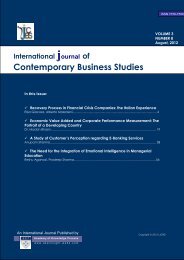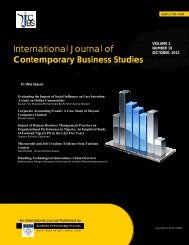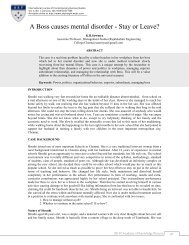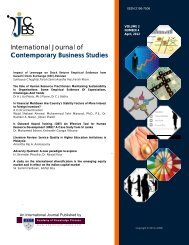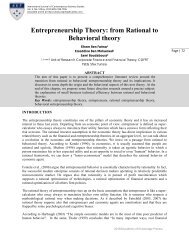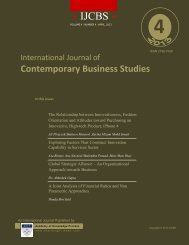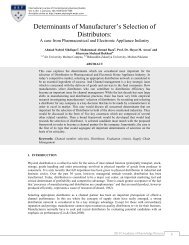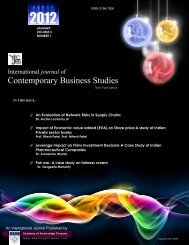Contemporary Business Studies - Academy of Knowledge Process ...
Contemporary Business Studies - Academy of Knowledge Process ...
Contemporary Business Studies - Academy of Knowledge Process ...
You also want an ePaper? Increase the reach of your titles
YUMPU automatically turns print PDFs into web optimized ePapers that Google loves.
International Journal <strong>of</strong> <strong>Contemporary</strong> <strong>Business</strong> <strong>Studies</strong>Vol: 4, No: 2. February, 2013 ISSN 2156-7506Available online at http://www.akpinsight.webs.comoperations, management, internal controls, interpersonal relationships, and communication.” Furthermore,Akers and Porter (2003) advocated that “the AICPA and the Institute <strong>of</strong> Management Accountantsrecognize emotional intelligence skills as critical for the success <strong>of</strong> the accounting pr<strong>of</strong>ession.” Similarly,Messmer (2004) stated that “successful FA’s must have analytical abilities, strong written and verbalcommunication skills, a creative mindset, and business acumen. They must be able to interview and elicitinformation from potentially uncooperative people and possess a strong amount <strong>of</strong> skepticism.” Thechallenge <strong>of</strong> delivering graduates with a more extensive and special skill sets is highlighted in a recent‘European’ study (Hassall et al, 2005). Their research points to similar employer demands for nontechnicalskills, but reported at the same time that employers were unsympathetic with claims fromUniversities that they had limited capacity to deliver on these greater demands. Consequently, a specialtraining process can be fashioned out to give interested accounting graduates an opportunity to acquirethese special skills that will make them specialists.Ramaswamy (2005) believed that “FA’s are distinctively positioned to be able to uncover financialdeceptions,” his prominent skills being an in-depth knowledge <strong>of</strong> financial statements, the ability tocritically analyze them, and a thorough understanding <strong>of</strong> fraud schemes. He also believed that FA’sshould have the ability to comprehend the internal-control systems <strong>of</strong> corporations and be able to assesstheir risks. The knowledge <strong>of</strong> psychology helps FA’s to understand the impulses behind criminal behaviorthat motivate and encourage financial deception. Also, interpersonal and communication skills that aid indisseminating information about the company’s ethics and an understanding <strong>of</strong> criminal and civil law and<strong>of</strong> the legal system and court procedures are skills that aid FA’s. Moreover, Rezaee, Crumbley andElmore (2006) surveyed opinions <strong>of</strong> practitioners and academics regarding the importance, relevance, anddelivery <strong>of</strong> forensic accounting education. Their results indicated that “the demand for and the interest inforensic accounting will continue to increase.” Their study further shows that both practitioners andacademics viewed accounting education as relevant and beneficial to accounting students. However, thegroups differed in opinions regarding topical coverage <strong>of</strong> forensic accounting. In searching for the skillarea <strong>of</strong> FA’s, DiGabriele (2008, 2009), in a US study found that “both academics and practitioners agreedthat critical thinking, unstructured problem-solving, investigative flexibility, analytical pr<strong>of</strong>iciency, andlegal knowledge are important and core skills for FA’s.”Ahadiat (2010) conducted a study in which he asked respondents to rate the skills expected <strong>of</strong> anaccountant and the auditor. The results from his study shows that “accounting curricula across the UnitedStates were revised to include instructions aimed at improving students’ knowledge, skills, and abilities,which would go beyond their technical knowledge. These skills included, communication skills,analytical skills, presentation skills, team orientation, critical thinking, among others.” However, a studyconducted by Sugahara and Coman (2010) attempted to compare the differences in ‘Japanese’ accountingfaculty and practitioners’ perceived importance <strong>of</strong> generic skills for CPAs in order to assess the CPA LawAmendment <strong>of</strong> 2003. It was found that “Japanese accounting faculty and practitioners commonlyperceived the information skill type as the most important, and the behavioral skill type as the secondmost important, but they tended to regard the interpersonal skill type as less important.” Severalimplications are also raised from the findings to improve the quality education <strong>of</strong> Japanese CPAs and alsoto facilitate the international harmonization <strong>of</strong> accounting education. <strong>Studies</strong> by scholars, such as Davis,Farrell and Ogilby (2010) and Ekeigwe (2011), highlighted that “analytical skill remains the foremosttrait that FA’s are expected to possess.” Their results also revealed that the skill sets <strong>of</strong> FA’s are eclectic.These include general civilization, communication, accounting, business, auditing, technology,psychology, criminology, courtroom behavior, and meta-thinking skills are critical to the effectiveness <strong>of</strong>a FA. Similarly, in a study conducted by Chukwunedu and Okoye (2011) revealed that “forensicaccounting techniques injected in an audit and given cost/benefit considerations is capable <strong>of</strong> increasingthe ability <strong>of</strong> the auditor to detect fraud and thus help bridge the audit expectation gap. This finding hasimplications for both accounting education and accounting practice.2013©<strong>Academy</strong> <strong>of</strong> <strong>Knowledge</strong> <strong>Process</strong>65



